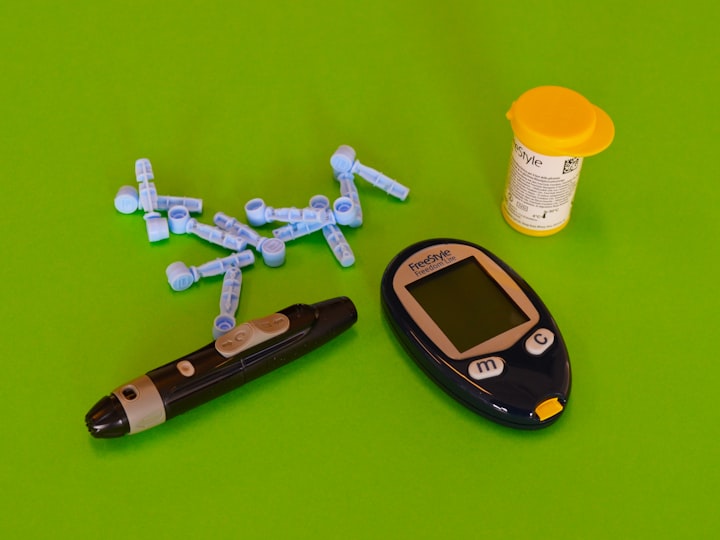Diabetes Basics: What is Blood Sugar?
Too low or too high? Understanding the importance of blood sugar

Disclaimer: The following information is based on my own research and lived experience as a type one diabetic and does not constitute medical advice. Information from this article should not substitute advice from your doctor or other healthcare professionals.
Welcome to part two of the Diabetes Basics series. The previous article covered what insulin is and its relationship to diabetes.
Just in case you missed it, you can check out that article here.
The next vital term to cover is blood sugar.
What does the term "blood sugar" mean?
Blood sugar is a more casual term for blood glucose. Blood sugar refers to the amount of glucose in a person's bloodstream. Blood sugar does not measure the glucose that is inside the body's cells.
In a person without diabetes, the body regulates blood sugar to keep levels in a very tight range. It does this in part through the hormone insulin, which allows sugar to go into the cells where the cells can use it for energy.
Only a certain amount of sugar remains in the bloodstream.
What is a normal level for blood sugar?
Blood sugar is measured in milligrams per deciliter. When I found this out, I was corrected in my thinking that I would never use deciliters in my work with the metric system. Hey, we can all be wrong.
For the non-diabetic, a normal fasting blood sugar level is 99 mg/dL or below.
A general normal range is around 80 mg/dL to 120 mg/dL. But the exact number and whether it indicates diabetes will depend a little on whether or not it is a fasting number.
Any number that falls outside of this range can indicate the need for intervention. This brings us to two more key terms:
- Hypoglycemia: This is when blood sugar levels drop too low. Typically, any number less than 70 mg/dL is considered hypoglycemia.
- Hyperglycemia: This when blood sugar levels rise too high. The exact "high" number that will require intervention will vary. But people with diabetes may shoot to keep this number below 180 mg/dL after eating.
Why is there so much fluctuation in blood sugar in a person with diabetes?
For people with diabetes, blood sugar levels frequently fluctuate because no amount of human effort can mimic what the body does naturally. If you have a normal pancreas, your body can maintain the delicate balance that keeps your blood sugar in a tight range. With problems with insulin production and response, people with diabetes cannot maintain this tight range as well.
Your body knows exactly when to release insulin and how much to release. Over time, people with diabetes adjust how much insulin or medication they use to try to mimic the body's normal response. However, this is difficult to do, and many factors can cause blood sugar levels to become too high or too low.
Blood sugar monitoring
People with diabetes can monitor their blood sugar via finger sticks or a continuous glucose monitor. Those doing finger stick checks typically test before meals, before exercising, before bed, and any time they feel "off." For example, I will typically have certain symptoms if my blood sugar gets too high or too low. When I experience these feelings, I know I must verify them with a concrete data point.
People with diabetes typically also get a hemoglobin A1C test a few times a year. This number measures their average blood sugar readings over the last few months.
The basic building blocks
At this point, we've covered the basics of blood sugar and insulin. These two major factors are "off" among people with diabetes. Once you understand these concepts, you can understand what diabetes is and the different types of diabetes.
For the moment, understand that blood sugar levels are difficult to regulate when the body isn't making enough insulin or responding to insulin the way it should.

Thanks for reading. If you liked what you read, consider subscribing, leaving a heart, pledging, or giving a tip. Pledging is an awesome addition to my coffee fund.
If you would like to receive regular updates on my work, please email me at [email protected] and ask to be added to my email list.
You can also follow me on Medium.
Professionally, I am a health and wellness freelance writer. You can check out my portfolio here. I would love to work with you.
Sources:
American Diabetes Association: All About Blood Glucose
American Diabetes Association: Hypoglycemia (Low Blood Glucose)
American Diabetes Association: Hyperglycemia (High Blood Glucose)
CDC: Monitoring Your Blood Sugar
About the Creator
Jessica Freeborn
Passionate writer that is enthusiastic about writing engaging, compelling content. Excels in breaking down complex concepts into simple terms and connecting with readers through sharing stories and personal experience.
Reader insights
Outstanding
Excellent work. Looking forward to reading more!
Top insight
Expert insights and opinions
Arguments were carefully researched and presented






Comments (1)
Excellent & informative. Thank you for sharing.